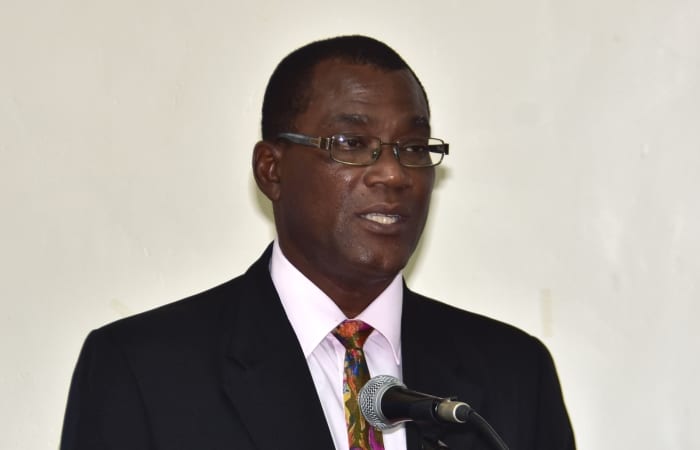
Director of the Coastal Zone Management Unit, Dr. Leo Brewster, addressing the launch of Barbados’ participation in the third International Year of the Reef 2018 at the Bellairs Research Institute recently. (C.Pitt/BGIS)
In the face of rising sea temperatures resulting from climate change, Barbados is continuing its efforts to monitor and manage the condition of its coral reefs.
This assurance has come from Director of the Coastal Zone Management Unit (CZMU), Dr. Leo Brewster, as he addressed the launch of Barbados’ participation in the third International Year of the Reef 2018 at the Bellairs Research Institute (BRI) recently.
These activities, he said, include repopulating the reefs through the Coral Lab now established at the BRI; coral spawning; investigating the concept of marine protected areas further and other public awareness activities, including coastal walks, planned for throughout the year.
“We have significant concerns regarding increasing water temperatures that we are periodically seeing around Barbados,” Dr. Brewster pointed out.
Those concerns relate to the inability of corals to respond to the changes quickly. As a result, the Director said officials were seeking out more resilient forms of corals from around the island to use the fragmentation process to repopulate reefs with the more resilient form.
Dr. Brewster further noted that Government was looking at the potential of coral spawning and monitoring to increase the production of the corals, and the type of management strategies that would need to be implemented.
However, he noted that the recognition of the International Year of Reefs coincided with activities undertaken over the last four years under the Coastal Risk Assessment and Management Programme being executed by the CZMU. “We have taken a whole new look at trying to integrate climate change and risk into the whole management of the coastal ecosystem from our perspective,” he explained.
One of the initiatives undertaken by the CZMU is managing reefs through the establishment of the Coral Lab with assistance through funding from the Inter-American Development Bank (IDB).
“The Coral Lab is based here at the Bellairs [Research Institute] and has been in operation for the last 18 months to two years where we have been trying to grow fragments of corals, rehabilitate them and then transplant them out on to the reef and monitor the rate of growth and development over that period of time,” the Director explained.
In addition, with assistance from the IDB, the CZMU has established and worked with the non-governmental organisation, Coral Reef Restoration Alliance Barbados (CORALL), to ensure that civil society has a role to play in the approach to managing the reefs.
“It is forging the link between Government and academia through Bellairs to take the process forward because we can’t do it all as Government,” the Director said.
